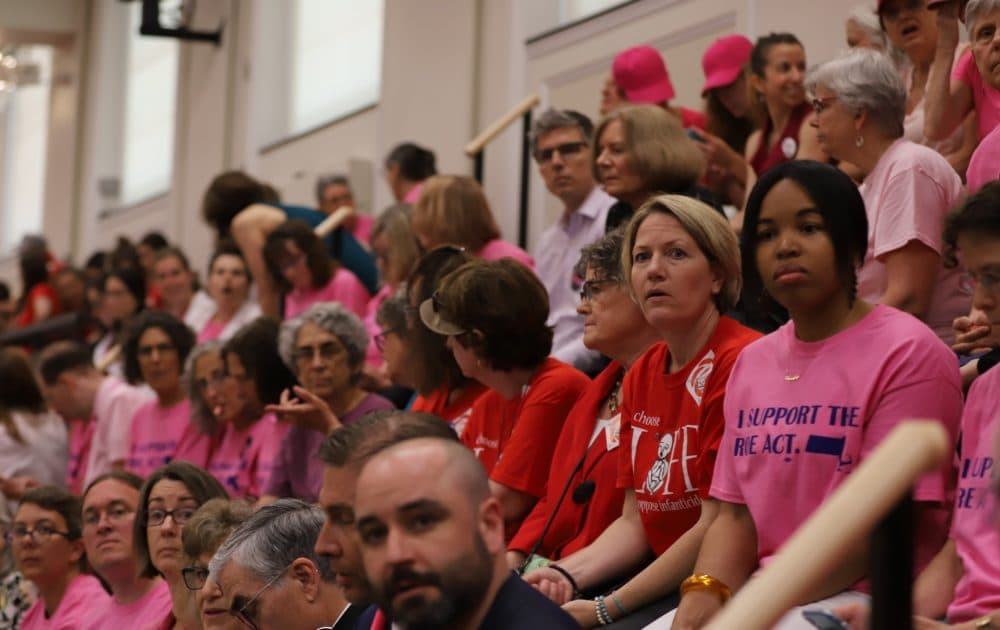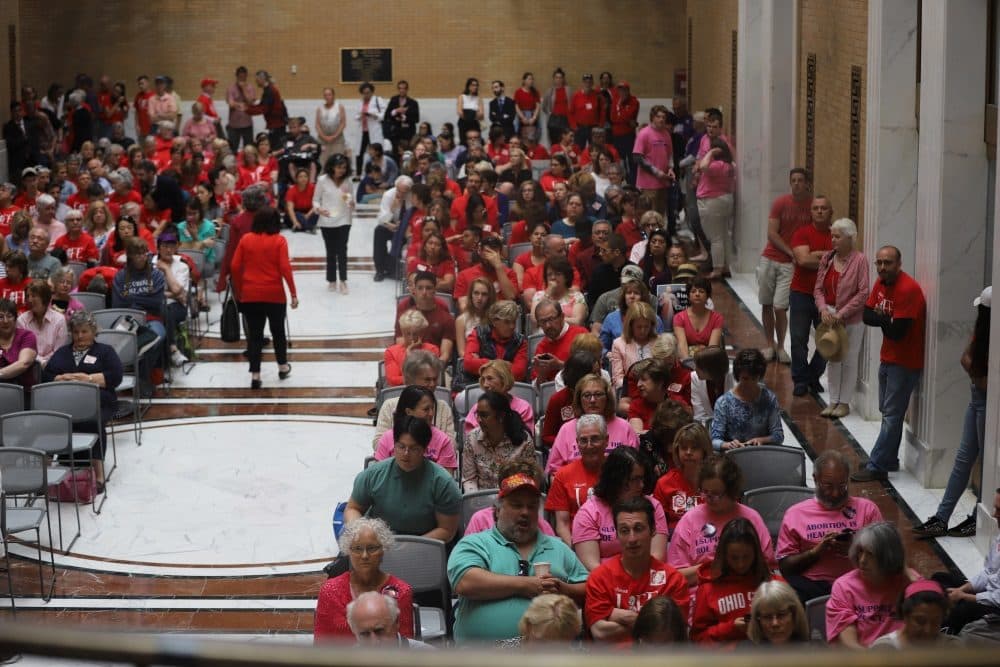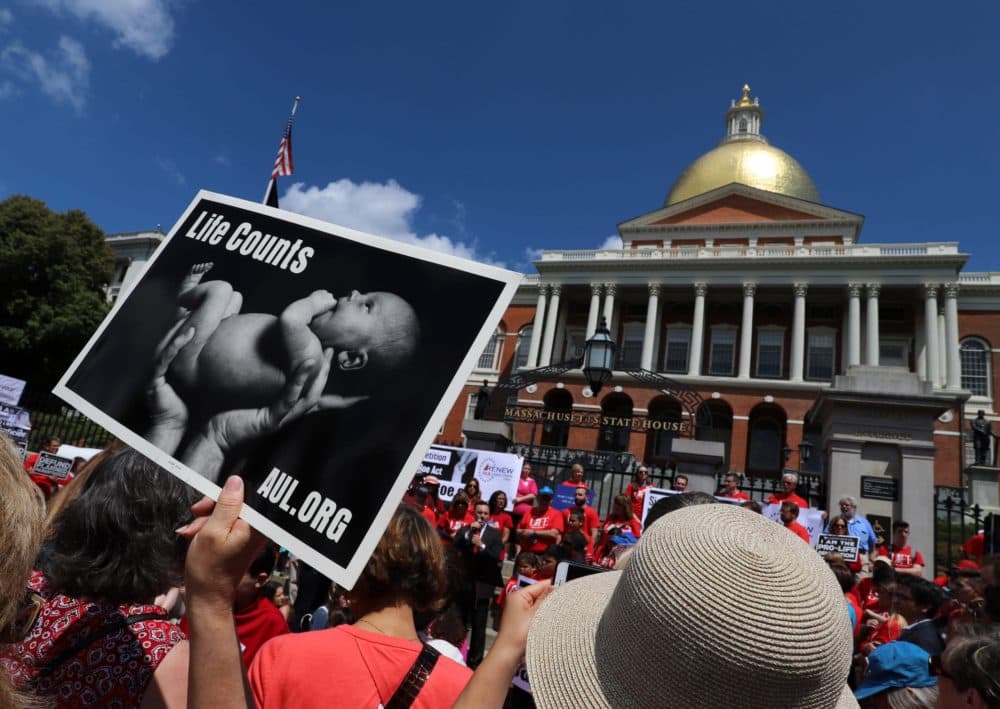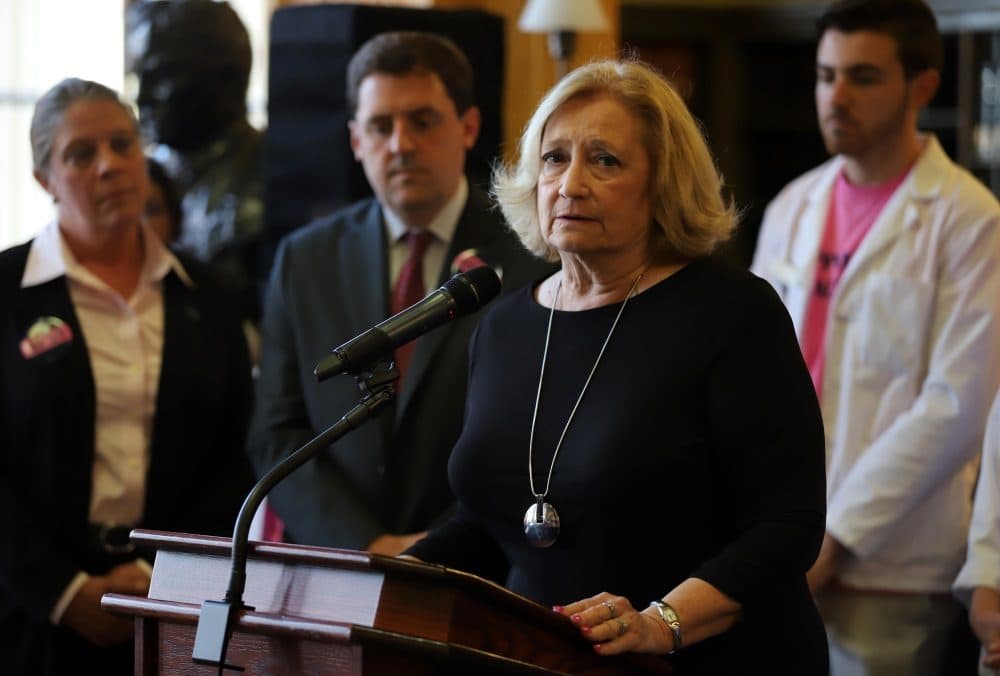Advertisement
Abortion Rights Supporters, Opponents Turn Out For State House Debate Over ROE Act

It's been held up as a bulwark against the conservative forces determined to overturn Roe V. Wade and decried as an opening to legalized "infanticide."
Supporters of the bill say access to abortion in Massachusetts needs to be protected against the whims of the courts, while opponents argue that the health and safety of women and teenagers will be put in jeopardy.
Even the ice cream chain JP Licks got involved to support the ROE Act, while former U.S. Attorney Frank McNamara compared backers to "Y2K fearmongers" who warned, wrongly, that computer systems were unprepared to transition to the new millennium.
The emotionally charged debate over abortion overtook the State House on Monday, where pro-life and pro-choice activists and lawmakers battled over the expansive abortion rights bill that would allow for abortions later in pregnancy.

Crowds on both sides of the issue, wearing pink in support or red in opposition, swarmed the State House, filling the auditorium where the Judiciary Committee was taking testimony and spilling into two overflow areas.
Attorney General Maura Healey and U.S. Rep. Lori Trahan were among the supporters who showed up to testify in support of the bill, which backers said would stop women from having to travel out of state for an abortion if they learn late in pregnancy that the fetus won't survive.
The bill would allow for abortions after 24 weeks to protect the physical or mental health of a patient, or in cases of diagnosed lethal fetal anomalies. The legislation would also get rid of parental consent requirements for teenagers, which supporters said could be an impediment for a small number of teens who are uncomfortable seeking the help of a parent or guardian.
"Abortion is health care and health care is a human right."
Carol Rose, executive director of the ACLU of Massachusetts.
Less than 2% of the 18,256 abortions performed in Massachusetts in 2018 were for minors, and 77% of those young women had parental consent, according to bill sponsors.
"Abortion is health care and health care is a human right," said Carol Rose, executive director of the ACLU of Massachusetts. "Women will not be equal members of society until we have full access to reproductive health care and full autonomy over our bodies."
Critics, however, warned that the bill would throw the doors wide open for abortions to be performed for any reason, and remove protections of patients, such as one that would no longer require an abortion after 24 weeks to take place in a hospital.
"We are pro-life from the womb to the tomb," said Eugene Rivers, a Boston activist and Pentecostal minister, who helped rally pro-life advocates outside the State House in the morning.

"We are pro-life from the womb to the tomb."
Eugene Rivers, a Boston activist and Pentecostal minister
The fight over abortion rights in Massachusetts is taking place a time when pro-life activists have scored a series of wins in more conservative-leaning states to curtail access. Advocates for choice believe the constitutional right to an abortion could be in jeopardy due to changes in the makeup of the Supreme Court, and want to make sure that Massachusetts protects it as a state right.
Gov. Charlie Baker has said he opposes "late-term abortions," but generally supports a woman's right to choose. The governor's concern with some aspects of the bill, however, has injected an added level of uncertainty to the debate with supporters potentially needing to muster a veto-proof majority, if legislative leaders decide to make a push for the bill's passage.
Baker, House Speaker Robert DeLeo and Senate President Karen Spilka all said Monday they wanted to wait for the committee to be able to review the bill, before deciding how to proceed.
The bill is co-sponsored by 104 legislators, including 22 in the Senate and 92 in the House. Though the group would be insufficient on its own to overturn a gubernatorial veto, many of the co-sponsors showed up to testify together, gathering around the bill's sponsors to showcase the strong level of support.
Speaker Pro Tempore Patricia Haddad, a sponsor of the ROE Act, said it was "outrageous" that opponents, including the Massachusetts Republican Party, would accuse backers of the bill of supporting "infanticide."
"This is not something that any of us takes lightly. This is not some desire on our part to suddenly make it willy nilly that any pregnancy has the opportunity for an abortion," Haddad said.
But Haddad said she's hopeful that after the hearing the Judiciary Committee will be able to use the testimony offered to strengthen the bill, suggesting an openness to changes that might be required to get it passed.

"This is part of the committee process. The committee process is going to make this a better bill and it is our hope is that it will dispel any of these misconceptions, so we're happy to make it a work in progress," Haddad said.
The bill is also backed by the ACLU of Massachusetts, Planned Parenthood League of Massachusetts, and NARAL Pro-Choice Massachusetts.
"The right to an abortion is as fickle as a court's opinion, and for me that's not good enough," said Senate President Emerita Harriette Chandler.
The right to have an abortion would still exist in Massachusetts even if Roe v. Wade were to be overturned at the national level, but proponents of the ROE Act fear that some of the restrictions, such as a 24-hour waiting period, that were put in place after the Roe decision could be put back on the table.
Chanel Prunier, a former member of the Republican National Committee and executive director of the Renew Massachusetts Coalition, helped organize a rally outside the State House ahead of the hearing in opposition to the bill. Several hundred opponents, mostly wearing red T-shirts, showed up to protest, before moving inside where they waited to testify.
Prunier said the elimination of the parental consent law would put teenagers at risk of being forced into abortions by abusers, and remove parents from an important decision. She also said opponents reject the idea that abortions after 24 weeks should not be required to take place in a hospital.
"There's no good reason to take them out of a hospital except Planned Parenthood's bottom line," Prunier said.
Kathi Aultman, a retired doctor who said she used to perform abortions in Florida, also rejected the idea that it could be beneficial for a woman's mental health to choose an abortion after 24 weeks if a doctor has diagnosed a fatal fetal abnormality.
"That is their argument, but it's not valid," Aultman said. "It's more valid that these women will have terrible guilt."
MassGOP Chairman Jim Lyons was also back at the State House with his wife to lobby his former colleagues against the bill. "The Infanticide Act shreds the last vestige of family connection, as it mandates that our youngest teenagers can access abortion without ever consulting family or parents," Lyons said in a statement released by the party. "Clearly, this extreme measure constitutes an all-out assault on both life and family."
In addition to Haddad, the bill was filed by Rep. Jay Livingstone in the House and Chandler in the Senate.
Addressing some of the concerns of critics, Livingstone said that in 2017, fewer than 25 women exercised their existing right to have an abortion after 24 weeks of pregnancy for mental health reasons. He also noted that Connecticut and Maine have done away with their parental consent laws without the negative consequences that have been warned about.
Rep. Colleen Garry, a member of the Judiciary Committee and a Dracut Democrat, called the bill "extreme," recounting numerous women she said she has heard testify over the years in front of the Judiciary Committee about the negative mental health impacts of choosing an abortion.
If passed, the ROE Act would build upon laws passed in recent years that wiped antiquated and unenforced anti-abortion laws from the state lawbooks, and protected health insurance coverage for reproductive health services.
Gov. Baker also signed into law a bill this year that would makes millions in state funding available for family planning clinics if they were to lose federal funding as a result of actions taken by the Trump administration.
This article was originally published on June 17, 2019.